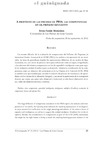Please use this identifier to cite or link to this item:
https://accedacris.ulpgc.es/jspui/handle/10553/12278
| DC Field | Value | Language |
|---|---|---|
| dc.contributor.author | Fontán Montesinos, Mª Teresa | en_US |
| dc.date.accessioned | 2014-10-03T02:30:21Z | - |
| dc.date.accessioned | 2018-03-15T14:28:16Z | - |
| dc.date.available | 2014-10-03T02:30:21Z | - |
| dc.date.available | 2018-03-15T14:28:16Z | - |
| dc.date.issued | 2012 | en_US |
| dc.identifier.issn | 0213-0610 | en_US |
| dc.identifier.other | WoS | - |
| dc.identifier.uri | https://accedacris.ulpgc.es/handle/10553/12278 | - |
| dc.description.abstract | La enorme difusión de la evaluación de competencias del Informe del Programme for International Student Assessment de la OCDE (PISA), los análisis e interpretación de sus resultados, las áreas de aprendizaje elegidas, las repercusiones didácticas de sus modos de diagnosticarlas, etc., nos sirven de pretexto tanto para reflexionar sobre el origen, el significado, y las relaciones del término competencia con los de capacidad e inteligencia como para sugerir las inteligencias múltiples (Gardner) para su desarrollo. Además la consideración de las competencias como un elemento del currículum en la Ley Orgánica de la Educación (LOE, 2006) es también una oportunidad para recordar la relación del proceso de enseñanza y de aprendizaje con los valores de la educación (integral), y reconocer la persistencia de la concepción docente que asume que quien sabe (dimensión intelectual) ya sabe hacer (dimensión técnica) y sabe ser (dimensiones ética y estética). | en_US |
| dc.description.abstract | The huge diffusion of competence assesment in the PISA report, the analysis and interpretation of its results, the learning areas selected, the teaching repercussion of its diagnostic ways account for a reflection on the origin, meaning and relation of the term to those of capacity and intelligence, as well as to suggest the multiple intelligences (Gardner) for its development. Besides the consideration of competences as part of the LOE (2006) curriculum, this might be the right frame to bring to mind the teaching-learning process relation to the values of education (integral) and to acknowledge the persistence of the teaching conception assuming that those who know (intellectual level) can already do (technical level). | en_US |
| dc.format | - | |
| dc.language | spa | en_US |
| dc.relation.ispartof | El Guiniguada | en_US |
| dc.source | El Guiniguada [ISSN 0213-0610], v. 21, p. 23-46 | en_US |
| dc.subject | 58 Pedagogía | en_US |
| dc.subject | 531204 Educación | en_US |
| dc.subject.other | Competencia | en_US |
| dc.subject.other | Capacidad | en_US |
| dc.subject.other | Inteligencia | en_US |
| dc.subject.other | Evaluación de competencias básicas del informe Pisa | en_US |
| dc.subject.other | Competence | en_US |
| dc.subject.other | Capacity | en_US |
| dc.subject.other | Intelligence | en_US |
| dc.subject.other | Competence assesment in the PISA report | en_US |
| dc.title | A propósito de las pruebas de PISA: las competencias en el proceso educativo | en_US |
| dc.type | info:eu-repo/semantics/article | en_US |
| dc.type | Article | en_US |
| dc.identifier.isi | 000215085000002 | - |
| dc.compliance.driver | 1 | - |
| dc.identifier.absysnet | 235347 | - |
| dc.identifier.eissn | 2386-3374 | - |
| dc.description.lastpage | 46 | en_US |
| dc.description.firstpage | 23 | en_US |
| dc.relation.volume | 21 | en_US |
| dc.investigacion | Ciencias Sociales y Jurídicas | en_US |
| dc.rights.accessrights | info:eu-repo/semantics/openAccess | - |
| dc.type2 | Artículo | en_US |
| dc.contributor.daisngid | 8477608 | - |
| dc.description.numberofpages | 24 | en_US |
| dc.utils.revision | Sí | en_US |
| dc.contributor.wosstandard | WOS:Montesinos, TF | - |
| dc.date.coverdate | 2012 | en_US |
| dc.identifier.ulpgc | Sí | es |
| dc.description.sellofecyt | Sello FECYT | |
| dc.description.esci | ESCI | |
| dc.description.erihplus | ERIH PLUS | |
| item.fulltext | Con texto completo | - |
| item.grantfulltext | open | - |
| crisitem.author.fullName | Fontán Montesinos, María Teresa | - |
| Appears in Collections: | Guiniguada. 2ª Etapa. n.21, 2012 Artículos | |
Page view(s)
327
checked on Jan 15, 2026
Download(s)
1,247
checked on Jan 15, 2026
Google ScholarTM
Check
Share
Export metadata
Items in accedaCRIS are protected by copyright, with all rights reserved, unless otherwise indicated.
